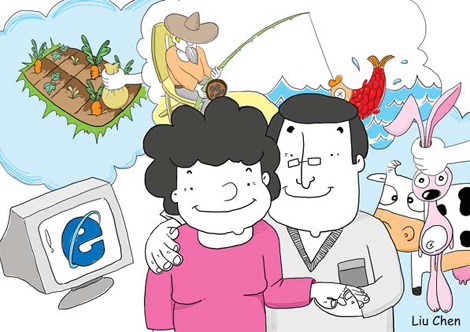Comment
Elders addicted to online world
By Wang Zhuoqiong (China Daily)
Updated: 2010-01-08 08:46
 |
Large Medium Small |

My parents have been married for 30 years. During that time, they have shared few common interests. They are so different, sometimes I wonder how they fell in love with each other in the first place.
But lately, they have both been captivated by one hobby - or become addicted to it, I should say. They spend hours and hours every day "growing vegetables", "feeding cows" and "parking Mercedes Benz" on Kaixin001.com, a social-networking website which is similar to Facebook but has additional applications including online games.
And, since I discovered they were online gamers, I have learned that my aunts and uncles, my colleagues and friends' parents are all surfing on the Kaixin website as well.
The website has been incredibly popular with Chinese white collar workers since last year. Its quirky activities that include "stealing vegetables and flowers" from other people's online gardens have become so popular that some netizens have questioned whether the site is turning the country into a "nation of thieves".
To build up "proper value" in online games, the Ministry of Culture has requested the company change the term from "steal" to "harvest".
Employees' obsession with the website has led many companies to ban logging on from the office to ensure work efficiency.
But compared with white-collar workers, elderly players have more time on their hands for online games.
Because many older users became fans of the website a year later than their younger counterparts, they started slow. But, because they have more time to spare and more experience with such things as farming and gardening, many older users are catching up with the younger ones in terms of credit earned on Kaixin's online games.
My mum has told me about how she found the most "profitable" flower to plant in the fields or that she had "bought" me a new Saab.
My dad, nodding along, praised how much wisdom my mum possesses, something that came in contrast to his comments about her stock-trading skills.
Elderly users play the games with different personal information. While young people use their real names to register, most elders log on with a fake name.
My aunt, who is 55, lies on Kaixin about her age.
"It would be embarrassing for you kids to find out a grandma is doing the same thing," she told me. "I am 31 on Kaixin and I am having fun."
The popularity of the Kaixin website among urban elders is because life after retirement in China can be very boring, at least it was for my parents.
Having survived starvation and the Cultural Revolution during their youth, my parents are the most austere people I know, although they have been gracious to me and other people.
They never went to the cinema or on travel overseas. Whenever I took a taxi, my mum nagged me that the subway is faster and cheaper. Having just moved to Beijing three years ago, my parents do not even have many friends in the city. Elder neighbors in the community where they live are reluctant to make new acquaintances.
Now, they can communicate frequently with their widely scattered relatives and friends - by "robbing" their garden or farm.
While the online activities may not always be completely honorary, for my parents the game offers fresh fun.
A couple of days ago, I bought them a new computer from Zhongguancun. Now they can get on Kaixin without fighting one another for the old computer. They love it.













